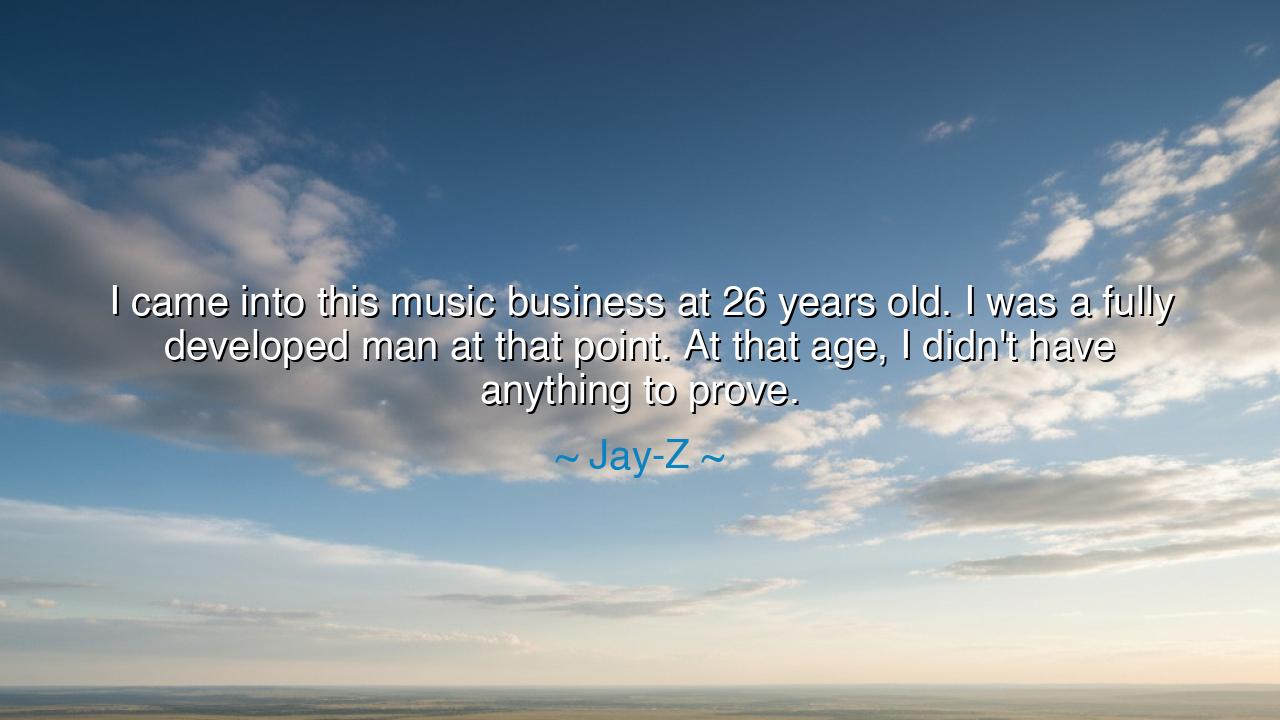
I came into this music business at 26 years old. I was a fully
I came into this music business at 26 years old. I was a fully developed man at that point. At that age, I didn't have anything to prove.






The words of Jay-Z—“I came into this music business at 26 years old. I was a fully developed man at that point. At that age, I didn’t have anything to prove.”—resonate like the calm declaration of a warrior who has already fought his battles before stepping into the arena. In them lies a profound lesson about maturity, self-knowledge, and purpose. He speaks not with the arrogance of youth, but with the quiet confidence of one who has come to understand himself. Jay-Z’s reflection is not merely about entering the music industry—it is about entering any field of life when one has already been tempered by experience and has learned the discipline of restraint. His words reveal a truth known to the ancients: that power is strongest when it is governed by wisdom, and that greatness blooms not from haste, but from preparation.
Before he became a global icon, Shawn Carter, known to the world as Jay-Z, had already lived many lives. Growing up in the rough streets of Brooklyn, he had seen both hardship and hustle; he had witnessed the fragility of dreams and the harsh cost of ambition. By the time he turned twenty-six, he had already weathered storms that would have broken lesser souls. His decision to enter the music business at that age was not driven by desperation for validation, but by the certainty that he had something real to say—and that his voice would not be silenced by insecurity. He had spent his youth building himself, so when opportunity came, he entered not as a boy seeking approval, but as a man bearing purpose.
There is a timeless power in what Jay-Z expresses here. In every age, the impatient rush toward recognition has tempted the young and unformed. Yet the wise have always known that one must first be forged by life before attempting to shape it. Consider the story of Marcus Aurelius, the Roman emperor and philosopher. Though born into privilege, he spent his early years in deep study and reflection, preparing his mind for the weight of leadership. When power finally came to him, he ruled not as a tyrant seeking to prove his worth, but as a servant of wisdom and virtue. Like Jay-Z, he entered his realm of influence not with noise, but with clarity. Both men demonstrate that true confidence is born not from the need to impress, but from the mastery of self.
Jay-Z’s statement also carries an implicit challenge to the modern world, where youth is often mistaken for strength, and speed for success. He reminds us that timing is sacred—that one’s season of arrival is as important as the destination itself. To enter any pursuit too early, without inner foundation, is to build a castle on sand. The applause of the world can lift you quickly—but it can also bury you just as fast. Jay-Z’s patience before fame allowed him to understand the game before he played it. He had already faced rejection, failure, and struggle; thus, when success came, it did not own him. This is the mark of maturity—to remain unmoved by both criticism and praise, because one’s value is not determined by others, but by one’s own understanding of purpose.
The ancient Greeks called this self-knowledge sophrosyne—the harmony of inner balance. It is the wisdom that teaches a man to act, not react; to speak, not perform. Jay-Z’s reflection embodies this virtue. At twenty-six, he had seen enough of the world to know what he was not. And in knowing what he was not, he discovered what he was. His lack of urgency to prove himself became his strength. This composure gave him longevity in an industry that devours those who rise too soon. It is a lesson that the greatest warriors, artists, and leaders have always shared: that patience is not weakness—it is readiness.
Consider, too, the story of Nelson Mandela, who entered the world stage not as a young revolutionary eager for recognition, but as a man refined by twenty-seven years of imprisonment. Like Jay-Z, Mandela’s delay was his strength. Those years of waiting transformed anger into vision, and ambition into leadership. When he finally stood before the world, he had nothing to prove—only something to offer. This is the same principle Jay-Z speaks of: when you are fully formed, you no longer chase validation, because you carry within you a deeper sense of calling. The world bends to those who know who they are.
Let this, then, be the lesson for all who hear these words: do not rush your becoming. Do not measure your worth by the timeline of others. Spend your youth not in proving, but in preparing. Work quietly, learn deeply, fail humbly. When the time comes, you will enter your chosen field not as a beggar of recognition, but as a master of yourself. Success will not dazzle you, and failure will not destroy you, for you will know your own measure. The one who has nothing to prove is the one who cannot be shaken.
And so, as Jay-Z reminds us, it is not the speed of one’s rise that determines greatness, but the strength of one’s foundation. To come into one’s calling at the right time is to arrive as a force of nature—steady, certain, and whole. When you reach that place, when your work flows from confidence rather than insecurity, the world will listen. For in every age, it is not the loudest voices that endure, but the most centered souls—those who, like Jay-Z, step forward not to prove themselves, but simply to be.






AAdministratorAdministrator
Welcome, honored guests. Please leave a comment, we will respond soon